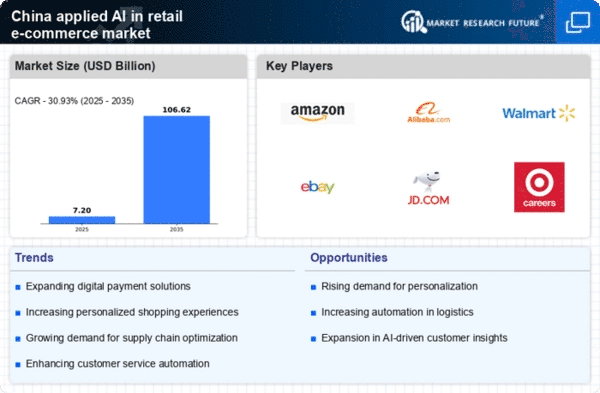Rapid Digital Transformation
The applied ai-in-retail-e-commerce market in China is experiencing a rapid digital transformation, driven by the increasing adoption of advanced technologies. Retailers are integrating AI solutions to enhance operational efficiency and customer experience. According to recent data, over 70% of retail businesses in China have implemented some form of AI technology, indicating a strong trend towards digitalization. This transformation is not only improving inventory management but also enabling personalized shopping experiences. As consumers increasingly expect seamless online interactions, the applied ai-in-retail-e-commerce market is likely to expand further, with businesses investing heavily in AI-driven tools to meet these demands.
Growing Consumer Expectations
Consumer expectations in China are evolving, with a marked shift towards personalized and efficient shopping experiences. The applied ai-in-retail-e-commerce market is responding to these demands by leveraging AI technologies to analyze consumer behavior and preferences. Recent surveys indicate that approximately 65% of Chinese consumers prefer brands that utilize AI for personalized recommendations. This trend suggests that retailers must adapt to these expectations to remain competitive. As a result, the applied ai-in-retail-e-commerce market is likely to see increased investment in AI solutions that enhance customer satisfaction and loyalty, ultimately driving growth in the sector.
Expansion of E-commerce Platforms
The expansion of e-commerce platforms in China is significantly impacting the applied ai-in-retail-e-commerce market. With the rise of major players and niche platforms, competition is intensifying, prompting retailers to adopt AI solutions to differentiate themselves. Data shows that e-commerce sales in China are projected to reach over $2 trillion by 2025, creating a fertile ground for AI applications. Retailers are utilizing AI for targeted marketing, inventory management, and customer engagement, which are essential for thriving in this competitive landscape. Consequently, the applied ai-in-retail-e-commerce market is likely to benefit from this expansion, as businesses seek innovative ways to capture consumer attention.
Regulatory Support for AI Adoption
The Chinese government is actively promoting the adoption of AI technologies across various sectors, including retail. Recent policies aimed at fostering innovation and digital transformation are creating a conducive environment for the applied ai-in-retail-e-commerce market. Initiatives such as funding for AI research and development, as well as tax incentives for businesses implementing AI solutions, are encouraging retailers to invest in these technologies. This regulatory support is expected to enhance the growth trajectory of the applied ai-in-retail-e-commerce market, as companies leverage AI to improve operational efficiency and customer engagement.
Increased Investment in AI Technologies
Investment in AI technologies within the applied ai-in-retail-e-commerce market is on the rise in China, as businesses recognize the potential for improved efficiency and profitability. Reports indicate that funding for AI startups in the retail sector has surged by over 50% in the past year, reflecting a growing confidence in AI's capabilities. Retailers are increasingly allocating budgets towards AI-driven analytics, customer service automation, and supply chain optimization. This influx of capital is expected to accelerate innovation and enhance the overall competitiveness of the applied ai-in-retail-e-commerce market, positioning it for sustained growth in the coming years.
















